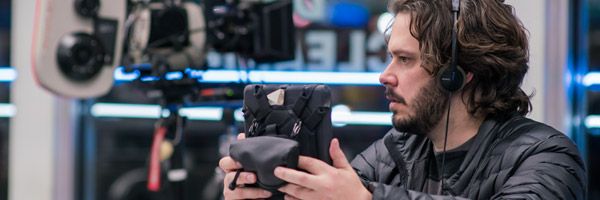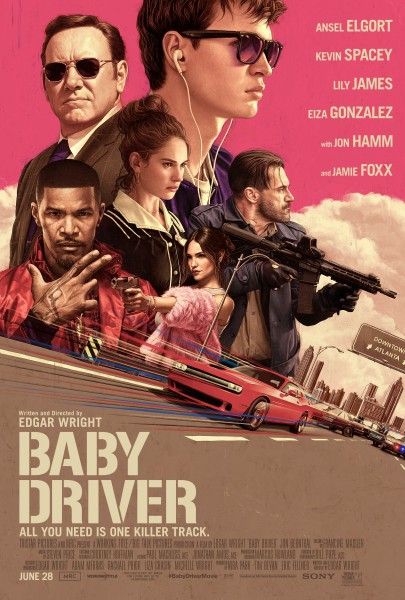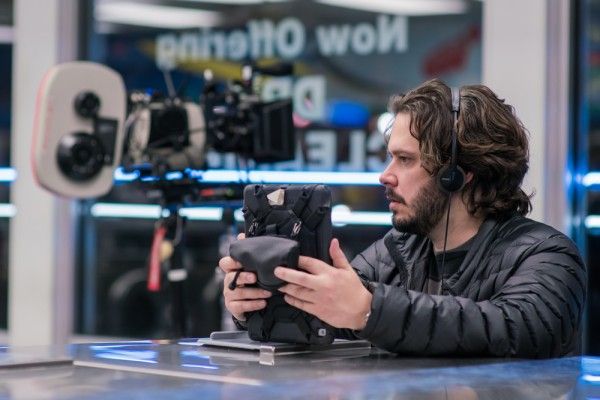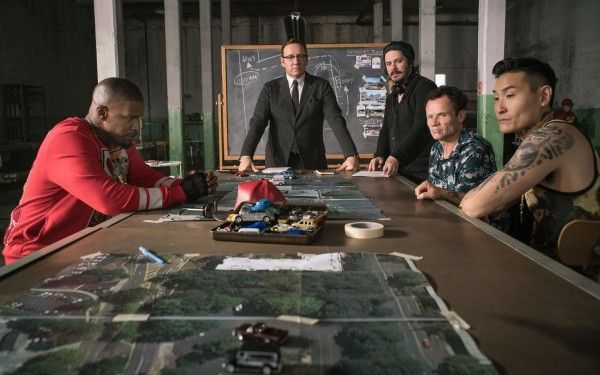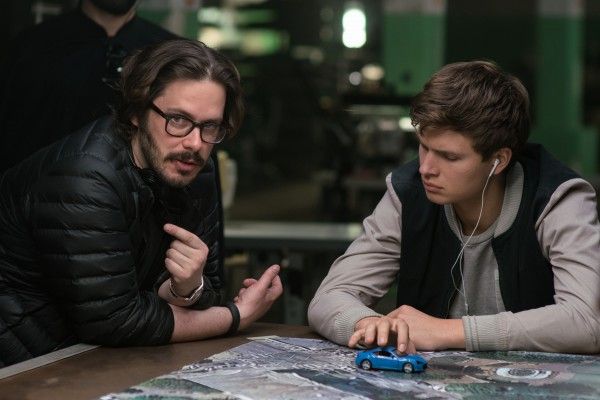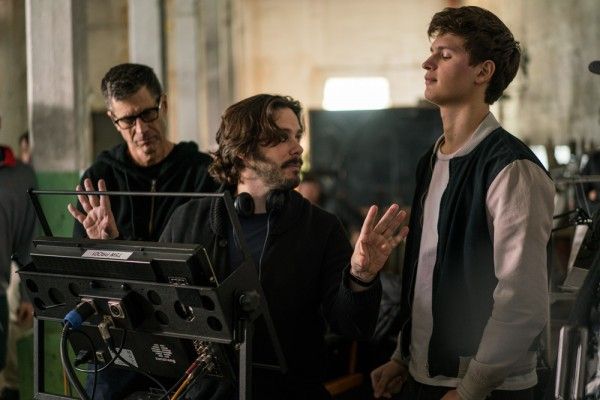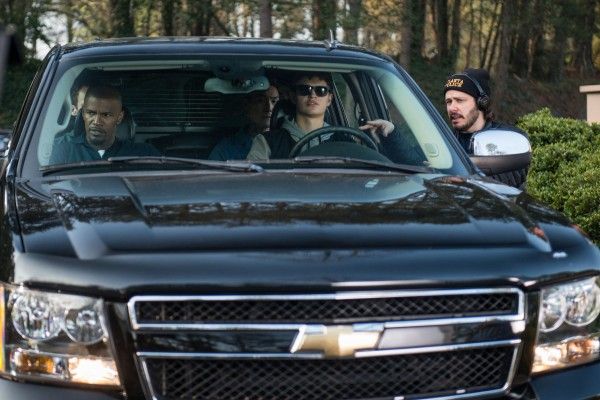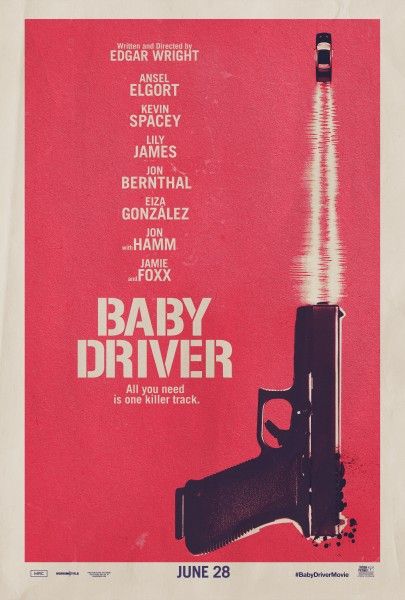The ‘silent hero’, the ‘one last job’, the ‘damsel in distress’ – all familiar tropes, but in Edgar Wright’s terrific Baby Driver, these standards are re-mixed and subverted anew. Baby Driver’s sort of the yang to the yin of Nicolas Winding Refn’s Drive. Both films take the familiar tropes that Walter Hill perfected in cult-classic The Driver – in particular Ryan O’Neal’s silent hero – and twist them on their head. For Refn that means beneath the visage of the stoic, silent hero lurks an emotionally unstable sociopath. For Wright, however, that means beneath the silent hero lurks a broken hearted child. Drive is all darkness and angst; Baby Driver is brightness and fun. One day, they’ll make a hell of a double feature.
In Baby Driver, Baby (Ansel Elgort) whiles away the hours as a getaway driver for a crew of bank-robbers (Jamie Foxx, Jon Hamm, Eiza Gonzalez) at the behest of mastermind Doc (Kevin Spacey). See – Baby incidentally stole some money from Doc and now to pay it off, must lend his considerable driving talents on a series of robberies. But after Baby falls in love with a wholesome waitress (Lily James), he yearns to get out of the criminal life to, well, less than ideal results.
In the following interview with Edgar Wright, he discusses subverting the tropes of crime films past, the importance of ‘original films’, and whether Walter Hill has even seen Baby Driver yet. He also gives updates on a number of projects in development (Grasshopper Jungle, Collider & Shadows) and discusses whether or not he’ll just make his own original material from hereon out. For the full interview, read below.
I was just reading the interview you did with Walter Hill for Empire on The Driver… So I’m interested, have you shown Baby Driver to Walter yet?
Edgar Wright: No -- he's very funny Walter. He makes a big point of 'I'm going to pay to see it.' I told him, 'He doesn't need to pay to see it.' The other day I was on the phone with him and he said, 'I saw your trailer in front of Alien: Covenant'. And I was like, ‘Why are you paying to see Alien: Covenant?’
[Walter Hill, of course, produced the original Alien; he has a 'Producer' credit on Alien: Covenant as well]
Wright: And he goes, ' Yeah - I'd just rather see it with paying audiences.' So I guess Walter Hill is going to pay to see Baby Driver, which is ridiculous. I told him I'd reimburse him the money... But he wasn't having it.
Well I’m interested to hear what he thinks [because] the character of Baby Driver is almost of subversion of the wordless [existential] hero of Walter's films.
Wright: …I mean, you always have strong, silent types in movies right back to Clint Eastwood and Steve McQueen or Alan Ladd. But I liked the idea of giving some sort of reasoning to [his silence]. Part of it has to do with his hearing issue, but also the idea that he doesn't want to talk too much with the rest of the gang because he doesn't want to make himself an object of interest. At the start of the movie, he's fooling himself that he's not a criminal. His policy seems to be sit at the back of class, don't make eye contact with anybody, just get my share of the profit and go home; but it doesn't really work like that because his very presence as this fresh-faced kid immediately sparks interest. So every time he's with a new crew he's being prodded and interrogated. I just liked this idea of the unpaid intern in the gang of bank-robbers being a source of curiosity.
How cognizant are you of the tropes of the heist genre and playing against them?
Wright: Oh, yeah -- I've watched hundreds of heist movies. So sometimes there's something you're specifically looking to subvert and sometimes through osmosis... But even the thing with the ‘one last job and I'm done’ [trope], it becomes more a case of language and misunderstanding. There's a difference between ‘one more job and I'm done’ and ‘one more job and we're straight’. Baby doesn't understand what the second part of that means…
In a lot of heist films, there's typically a detective character [Bruce Dern in The Driver; Pacino in Heat]. What made you steer away from that formula?
Wright: I wanted no speaking police parts because I wanted this sense of law enforcement on the fringes of the story, their presence getting ever and ever bigger… Do you ever watch police chase videos?
Yeah, sometimes.
Wright: There's a really nightmarishly garish video that some kid… It's not a funny story. This ends really badly. This kid, who was pretty much a straight A student, for some reason was speeding and did not stop when the cops chased after him and that one decision to hit the accelerator rather than the break turns into the last fifteen minutes of [his] life. Those videos of police chases where someone’s in a car or they're fleeing on foot and you can see [from] the helicopter shots, the car coming in or the police officers coming in -- it's just nightmarish to me. I'm not a big games player but when I'm playing things like Grand Theft Auto, there’s this sheer intensity of the law enforcement showing up. The premise of [Baby Driver] is that you start the first heist with the fantasy of being in a high-speed chase. Then the second and the third chase introduce real life elements, which make things morally complex. There are really tough life or death decisions. This sense of human collateral. So I wanted to make a crime movie, especially for a Grand Theft Auto generation, where all of these choices have devastating ramifications. So the second chase basically destroys all of Baby's attempts to blanket himself to what's happening and then the third heist forces him into some really tough decisions.
I have to ask about Grasshopper Jungle [which Wright recently signed onto] -- Is that going to be your next movie?
Wright: Potentially. It’s one of a couple of things that I’m developing. It’s a book that I really enjoyed and there’s a good screenplay and stuff. The exact next thing I don’t have entirely worked out, but that is one of the things in the mix, yeah.
What attracted you to the project?
Wright: The book was really good, a really interesting way of doing a coming-of- age movie and I thought it was really progressive as well.
What about Collider [a project Wright’s been developing for a couple years] -- what's the status on that film?
Wright: That’s another one that’s in sort of the mix. That’s something that’s really in the script stage. It’s quite an ambitious idea; it’s something we’ve been working on for quite a while.
And finally -- what's the status on Shadows [an animated feature Wright has been attached to for years]? I know DreamWorks has had some behind the scenes turmoil...
Wright: Well, I wrote three drafts of that, but because of the whole regime change there, most of the people that hired me and David Walliams to do it, don’t work there anymore. So at the moment that’s not something that I’m necessarily attached to, I think. It’s something that’s TBD.
Well -- Baby Driver almost strikes me as a meta-commentary on working within the Hollywood system. Here's this super talented guy forced to do one last job for the suits when all he really wants to do is make mix-tapes for himself. Do you see the movie that way at all?
Wright: I never really thought of it in those terms. I mean subconsciously maybe, but not intentionally. It's funny. Somebody said to me the other day 'Oh you've thought of Baby Driver since you were 21 and back in your early 20s, you were working as a young director for BBC - so do you identify with Baby because you were once this young wunderkind working in a big organization?’ I hadn't thought of it like that, but maybe there is something in there. Sometimes there are things that people want to project that might be right subconsciously but you never vocalized it to yourself…
[Pause]
Wright: You know – I don't really want to just be in my bedroom, making mix-tapes. I want to make summer movies for people to enjoy in the cinema. I remember when I left a certain movie, James Gunn wrote this really sweet message, but he said this thing about 'how I’m one of our great independent voices and hopefully we'll see some more independent films from me.' And I was thinking technically all of my movies have been financed by the studios. Shaun of the Dead, Hot Fuzz, The World's End. At the end of the day, here's the thing, Baby Driver is an original movie financed by a studio. It's so rare in this day and age that you get a summer movie that isn't an adaptation or a remake or part five of something. Not to say that I wouldn't do a Baby Driver 2 because if there was the opportunity, I probably would. It's my dream movie of putting action and music together and I have an idea of how it would continue; but I feel very proud an original movie is going to be released wide in the cinema. Because the thing with franchise movies, even though there's some great examples and usually every year there will be one great movie that people will say, ‘See, this proves that franchise filmmaking isn't dead’; but back in the day, Back to the Future was the number one of something. Alien was the number one of something. Star Wars was the number one of something. So what's frustrating for me is that... Die Hard was the first of something. When they made Die Hard, they weren’t saying, ‘And then in part five he's in Russia…
I hope not...
Wright: Sometimes, I think, audiences get burnt out on [franchises] and I do too. Like can I just enjoy one movie without having to think about the next one? I just want a movie to have an ending. All those movies I just mentioned have killer endings. Back to the Future has one of the greatest endings of all time and if there was never a Part Two or Three, it doesn't matter. Die Hard – if John McClane never had any more adventures - great! He had that one crazy night at Nakatomi Plaza. I'm not against popcorn movies at all. All of my movies are popcorn movies but when Raiders of the Lost Ark came out in 1981, it was the first. I want more ‘first’. I want more original movies both in the independent and in the studio world. I want more genre movies and event popcorn movies that are the number one of something and not the remake of something twenty years old or the part five of something. There's no reason you can't have a new Raiders of the Lost Ark. There's no reason why you can't have a new Star Wars. So given the opportunity to make an original movie, you just have to grab it with both hands. I fully recognize how rare it is and how fortunate I am to have the opportunity and how grateful I am that I got to do it. It's as simple as that.
Then do you see yourself steering now into just original material?
Wright: I don't know. It just depends... I'll never say never. If I signed up to do James Bond, everybody would be like Edgar Wright's a fucking liar. Simon Pegg brilliantly said in interview after Shaun of the Dead... An interviewer asked him 'Are you going to go to Hollywood now?' And Simon said, 'No - it's not like I'm going to go off to Hollywood and make Mission Impossible 3' That is literally what he did. So I always think you should never say anything on record that may come back on you.
Baby Driver is now in theaters.

